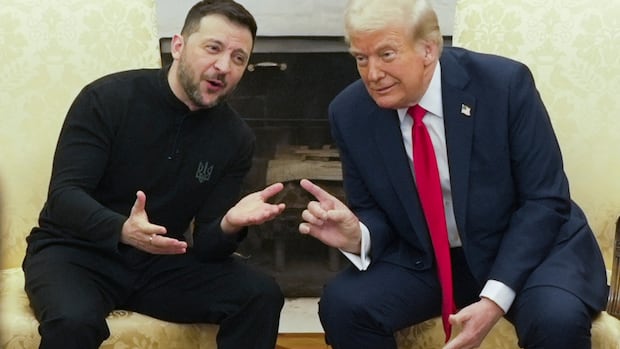U.S. President Donald Trump once again lashed out at Volodymyr Zelenskyy on Wednesday, as his Secretary of State Marco Rubio bowed out at the last minute for planned talks between American, Ukraine and European officials in London to end Russia’s war in Ukraine.
Rubio’s no-show prompted a broader meeting of foreign ministers from Ukraine, Britain, France and Germany to be cancelled, although talks continued at a lower level, with Ukraine envoy Gen. Keith Kellogg attending instead.
The meeting was a follow-up to a similar session in Paris last week with U.S., Ukrainian and European officials. During those talks, Trump’s special envoy Steve Witkoff presented a paper to the participants outlining proposals in which Ukraine in particular, but also Russia, would need to make concessions, according to three diplomats aware of the talks.
But the sources said that among the U.S. proposals was recognizing Russia’s illegal annexation of Crimea, a move that was a non-starter for Europe and Ukraine.

Zelenskyy said as much to the Wall Street Journal in a Wednesday report, prompting Trump on social media to chide the Ukraine president for “inflammatory statements” that were “very harmful to the peace negotiations.” Trump’s outburst evoked a late February White House meeting in front of cameras in which he and Vice President JD Vance berated Zelenskyy for what they characterized as a lack of gratitude for U.S. military aid to Ukraine in the war.
“The situation for Ukraine is dire — He can have peace or, he can fight for another three years before losing the whole country,” Trump said on Truth Social on Wednesday.
Trump in the post also again blamed former U.S. president Barack Obama for allowing Russian rebel incursions into Crimea in the mid-2010s.
Yulia Svyrydenko, Ukraine’s deputy minister, said on social media that Kyiv would not recognize Russian sovereignty over Crimea.
“Ukraine is ready to negotiate — but not to surrender,” Svyrydenko wrote on X. “A full ceasefire — on land, in the air, and at sea — is the necessary first step. If Russia opts for a limited pause, Ukraine will respond in kind. Our people will not accept a frozen conflict disguised as peace.”
U.K. talks downgraded after Rubio withdrawal
Both Rubio and Trump warned late last week that Washington could walk away from talks involving Ukraine and Russia if there was no progress on a deal soon.
Rubio spoke to British Foreign Secretary David Lammy late on Tuesday and said he looked forward to rescheduling his trip in the coming months after Wednesday’s “technical meetings.”

A spokesperson for British Prime Minister Keir Starmer played down any disappointment over Rubio’s abrupt cancellation and said the talks involved “substantive technical meetings with European, U.S. and Ukrainian officials on how to stop the fighting” triggered by Russia’s full-scale 2022 invasion.
“We remain absolutely committed to securing a just and lasting peace in Ukraine and these talks today are an important part of that,” the spokesperson said.
The downgrading of the talks came amid a deadly drone attack in the Ukrainian city of Marhanets early Wednesday. A Russian drone hit a bus, killing nine people and injuring close to 50, Kyiv officials said.
Zelenskyy said the bus was transporting workers of a mining and processing plant.
“An ordinary bus. Clearly a civilian object, a civilian target,” Zelenskyy said on X.
Rubio last week said the U.S. framework for a peace deal that he and Witkoff proposed in Paris received an encouraging reception.
But multiple sources told Reuters that some of Washington’s proposals were unacceptable to European countries and Kyiv. French Foreign Minister Jean-Noel Barrot said on Tuesday that the Europeans had detailed to the United States what they view as the non-negotiable aspects of a potential peace accord.
Beyond Crimea, other major sticking points remain, including Russia’s push for lifting European Union sanctions against it before negotiations are finished, which Europe staunchly opposes, diplomats told Reuters.
Washington proposed last week to establish a neutral zone at the Zaporizhzhia nuclear power plant in Russian-occupied Ukraine, according to European diplomats. Zelenskyy said on Tuesday he would be ready to partner with the United States to restart the plant.
Ukraine and the Europeans would also need to accept Russia’s control of the remaining 20 per cent of Ukraine’s territory. In addition, NATO membership for Ukraine would be ruled out and the U.S. would begin to lift sanctions on Russia.
NATO Secretary General Mark Rutte said he would be travelling to Washington on Thursday, for planned talks with Rubio, Secretary of Defence Pete Hegseth and National Security Advisor Mike Waltz
Putin touts weapons production, but wants more
Some of Washington’s ideas are also likely to displease Moscow. Two diplomats said the U.S. was not pushing a Russian demand to demilitarize Ukraine and was not opposed to a European force as part of future security guarantees for Ukraine.
The White House has said that Witkoff will meet with Russian President Vladimir Putin this week in Russia.
As the U.S. attempts to push Ukraine toward a ceasefire, Russia appears to be heading in the opposite direction. CBC’s Terence McKenna examines the latest moves and why some think Vladimir Putin might be trying to manipulate Donald Trump through his billionaire real estate buddy.
Putin comments on Wednesday signalled that Russia intends to further ramp up military production in the fourth year of its war in Ukraine, even as it holds talks on prospects for ending the conflict.
Putin told a meeting of the state Military-Industrial Commission that while 1.5 million drones of various types had been produced last year, “there are still not enough of these weapons.”

